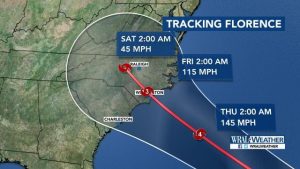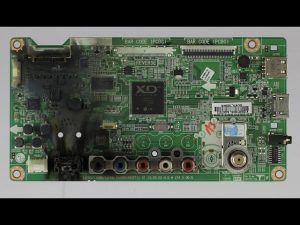If you live in the southeastern United States, you’re undoubtedly bracing for the possibility of a major hurricane later this week. Based on current storm trackers, forecasters are characterizing Hurricane Florence as potentially the most devastating storm to hit the Carolina coast in 3 decades. Florence is currently expected to make landfall late Thursday/early Friday. As such, the time is now to start protecting your electronics and important data.
Once you raid the grocery store for break, milk & beer, it’s a good time to protect your electronics and data from natural disasters. Thus, I have listed a few precautionary measures that users should take to protect data and equipment when the weather takes a threatening turn.
- Backup your data – this goes without saying, whether weather is threatening or not. ALL of your data should be backed up to protect against data loss resulting from natural disasters, malware attacks, hacks and other threats to your data security. If you backup to a hard drive, make sure you’re storing it offsite in the event of fire or flood. Best practice is to have combination of cloud and local (but offsite) backup.
- Unplug your stuff – unplug power cords AND network cables. This applies to computers, televisions, servers, tablets, routers, mobile phones, etc. Just take care to perform a normal shutdown of computers rather than putting them to sleep or hibernation before unplugging from the wall.

- Use surge protectors – If your equipment must remain “up” during a storm, make sure it’s connected to surge protectors (NOT power strips) or battery backups to protect against mild electrical impulses. While most surge protectors will not protect against a direct hit, they should absorb mild jolts. Even if your electronics are plugged into a surge protector, though, you should still shut down your devices and disconnect the surge protector from the wall when thunderstorms are near.
- Charge phones, laptops & tablets BEFORE the heavy stuff arrives – as long as cell towers are unaffected, you should be able to communicate with the outside world even during local power outages.
People frequently ask me whether it’s best to put their computers to sleep at night or shut down completely. I typically put my machines to sleep at the end of the day so that they start up quickly in the morning. However, during summer months when thunderstorms can develop rapidly or whenever foul weather is imminent, I always shut my equipment down and pull the power and data plugs for extra peace of mind.
Finally, don’t wait until storms are on the approach to take these steps. If you’re leaving for the weekend, go ahead and take precautionary measures to protect your gear. If you’re already on the road and your devices are connected to surge protectors, hope for the best.
Remember, an ounce of prevention can be the difference between protecting your assets/data and scrambling to recover it!

